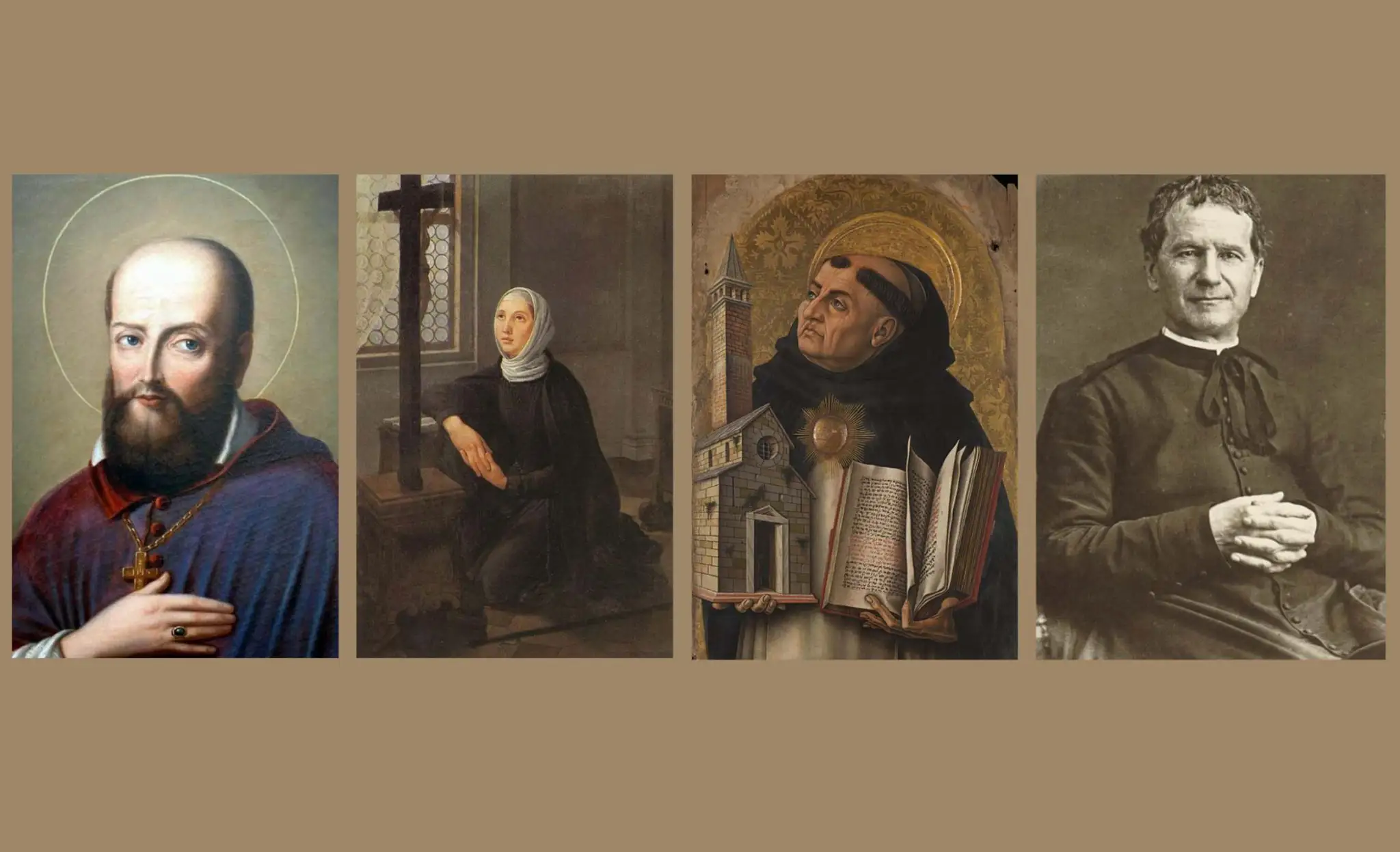Four teacher saints who inspire Catholic educators today (Catholic Schools Week)
During the last week of January, the feast days of four inspirational saints are celebrated: St. Francis de Sales, St. Angela Merici, St. Thomas Aquinas, and St. John Bosco. Each of these saintly teachers influenced the landscape of Catholic education in their own profound way.
For educators and students alike, these saintly teachers can serve as inspiration for teaching and learning in the modern age.
St. Francis de Sales
A 16th-century bishop and Doctor of the Church, St. Francis de Sales played a significant role in shaping education through his writings and practical initiatives. His feast day is celebrated on Jan. 24.
St. Francis de Sales, along with St. Jane Frances de Chantal, founded the Visitation Order in 1610. The order focused on the education of girls, particularly those from less privileged backgrounds. He believed in making education accessible to all, irrespective of social status or gender. His efforts to establish schools and educational institutions reflected a commitment to providing education to a broad spectrum of society. The Visitation Sisters established schools that aimed to provide a holistic education, combining academic instruction with spiritual and moral formation.
St. Francis de Sales advocated for a gentle and compassionate approach to teaching. His famous work, “Introduction to the Devout Life,” included guidance on education, emphasizing patience, kindness, and understanding in the educational process. This approach influenced educators to consider the individual needs and disposition of students.
St. Francis de Sales wrote extensively on education, providing practical advice to teachers and educators. His works, including letters and treatises, addressed the importance of forming character, fostering virtue, and creating a positive learning environment. These writings have and still so serve as a guide for Catholic educators seeking to integrate Christian values into their teaching.
The educational principles and practices promoted by St. Francis de Sales have had a lasting impact on Catholic education. The Visitation Order, inspired by his vision, continues to be involved in educational initiatives, and his teachings are referenced by educators seeking to integrate spirituality and academics.
St. Angela Merici
St. Angela Merici, whose feast day is celebrated on Jan. 27, was an Italian religious educator and foundress who made a significant impact on education, particularly through the establishment of the Ursuline Order.
Merici founded the Company of St. Ursula in 1535 in Brescia, Italy. The Ursulines were a group of women dedicated to the education of girls, with a focus on Christian values and practical life skills. The order aimed to provide education within the context of the family and society.
Merici’s approach to education was innovative for her time. She emphasized the importance of adapting teaching methods to the needs and abilities of the students. Her vision of education went beyond mere academic instruction; she believed in educating the whole person, fostering spiritual, moral, and intellectual development.
Merici’s holistic approach to education, which recognized the importance of nurturing the spiritual, moral, and intellectual dimensions of individuals, is still valuable to this day. Catholic educators today can learn from this approach and strive to educate students not only academically but also to help them develop as well-rounded individuals.
St. Thomas Aquinas
St. Thomas Aquinas, often considered the most influential Doctor of the Church of all time, is celebrated on his feast day on Jan. 28.
St. Thomas Aquinas played a key role in the development of Scholasticism, a medieval educational and philosophical movement that sought to reconcile faith and reason. His integration of Aristotelian philosophy with Christian theology provided a systematic and rational framework for understanding the relationship between faith and knowledge.
He emphasized the compatibility of faith and reason, arguing that both are avenues to truth. This idea became foundational in Catholic education, encouraging scholars to pursue intellectual inquiry within the framework of Christian beliefs. The synthesis of faith and reason has been a guiding principle in Catholic educational institutions.
St. Thomas Aquinas wrote extensively, and his most famous work, the “Summa Theologica,” remains a cornerstone of Catholic theology. This systematic presentation of Christian doctrine and moral theology has been used as a textbook in seminaries and theological schools, influencing the curriculum and content of Catholic education.
St. Thomas Aquinas’ influence extends beyond his lifetime, contributing to the formation of the Catholic intellectual tradition. His works continue to be studied in Catholic educational institutions, and his philosophical and theological ideas are integrated into various disciplines. For Catholic students and educators, the writings of St. Aquinas are must-reads.
St. John Bosco
St. John Bosco, also known as Don Bosco, was a 19th-century Italian Catholic priest, educator, and founder of the Salesians of Don Bosco, who had a profound impact on education, particularly for disadvantaged youth. His feast day is celebrated on Jan 31.
St. John Bosco founded the Salesians of Don Bosco, a religious order dedicated to the education and welfare of poor and marginalized youth. The Salesians established schools, orphanages, and vocational training centers, focusing on providing a holistic education that combined academic, spiritual, and practical skills.
Don Bosco developed the “Preventive System” of education, which emphasized a preventive rather than a punitive approach to discipline. This approach involved forming close relationships with students, understanding their needs, and preventing misbehavior through positive guidance and support. The preventive system aimed to create a nurturing and supportive environment for the holistic development of young people.
The Salesians, inspired by St. John Bosco’s vision, established educational institutions globally. Today, Salesian schools and missions continue to provide education and support to youth in various countries, particularly in regions facing economic and social challenges.
Bosco’s approach can be adapted by modern teachers to help create nurturing and productive environments in the classroom. Bosco’s preventive approach can help teachers build positive relationships with students.
Featured image: From left: St. Francis de Sales, St. Angela Merici, St. Thomas Aquinas, and St. John Bosco.


